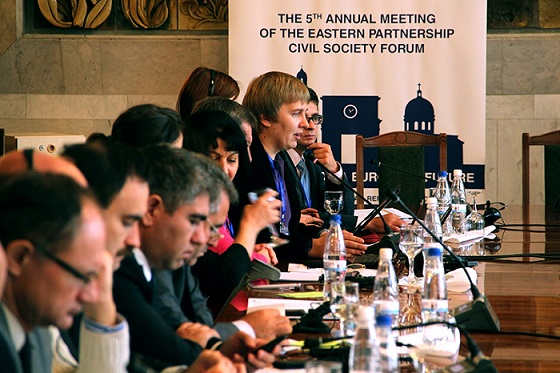|
IN THE SPOTLIGHT |
Eastern Partnership Civil Society Forum
|
|
Forum in Chisinau adopts ten key resolutions calling on the EU and EaP countries to ‘retain multilateral character’ of Eastern Partnership08.10.2013 Ten key resolutions and statements were adopted during the 5th Civil Society Summit last week during the productive two-day event in Chisinau with more than 250 participants from 28 countries. Two panels, five working groups and over sixteen subgroups focused on major policy issues concerning developments in EaP countries. During the panels the participants discussed the context of Association Agreements before and after the Summit in Vilnius and tried to assess reform processes in EaP countries with the help of European Integration Index.
The key message of the participants of the Forum is reflected in the General Statement adopted stating that Forum ‘reiterates its support for the Eastern Partnership (EaP) as an effective and peaceful mechanism of promoting democratic reforms including the establishment of the rule of law and sustainable market mechanisms in the six EaP countries: Armenia, Azerbaijan, Belarus, Georgia, Moldova and Ukraine, and calls on the EU member states and EaP governments to retain its multilateral character’. And that the ‘progress on Association Agreements (AAs) by some of the EaP countries should not cause major differences in the treatment of EaP countries by the EU’ in general.
The Forum called on the EU member states to support the declaration by Ukraine, Moldova, and Georgia of their will to closely cooperate with the EU and implement a European choice in the Resolution and expresses its concern with the constant political and economic pressure exercised by Russian Federation towards the Eastern Partnership countries, condemning the ‘intention of the authorities of the Republic of Armenia to join the Customs Union and participate in the Eurasian Union’. The Forum as well called for ‘creation of favourable conditions for unimpeded functioning of civil society organisations in Azerbaijan and Belarus and views as unacceptable the existence of political prisoners in Eastern Partnership countries’. It drew attention to the fact that ‘the Azerbaijani government has failed to implement the recommendations of the Venice Commission of the Council of Europe and of the OSCE/ODIR to improve the electoral legislation and practise’, calling ‘on the Azerbaijani government to conduct the presidential election on October 9 in accordance with international standards’.
The Forum also called on EaP governments to take the outcry against corruption from their citizens seriously and respond with concrete actions to elevate transparency and accountability. The Forum participants believe that ‘Vilnius summit must continue to focus on finding the best way of supporting the reform process in all the EaP countries. There can be no better way of securing the EU’s security than by continuing to work for the establishment of legitimate regimes and prosperous societies on its eastern borders’.
Among major resolutions adopted was the visa liberalisation process, calling on the EU to grant visa free travel to citizens of Moldova, ‘as soon as possible’ and illegal surveillance that is used by ruling powers to control the opposition, media, and civil society in EaP countries. The working groups and subgroups adopted solutions on youth, good local governance, climate change, introduction of all-party liability mechanisms for environmental risk, on eliminating barriers for people with disabilities, and ensuring high support from the European Neighbourhood instrument 2014-2020 for fighting poverty and social exclusion in the Eastern Partner countries, and some others. All adopted resolutions can be found below: A summary of resolutions adopted by the Eastern Partnership Civil Society Forum |
Project funded by the European Union
![]()











